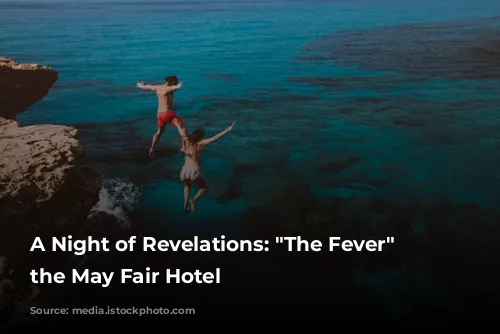Imagine walking down Piccadilly, London, on a chilly evening. Every few steps, you encounter the homeless, seeking shelter from the cold in doorways. Yet, just a few steps later, you enter the May Fair Hotel, a haven of luxury, a cocoon of opulence. You’ve secured a highly sought-after ticket to witness a captivating performance of Wallace Shawn’s “The Fever” – a powerful monologue delivered by the talented Tobias Menzies (remember him as Edmure Tully in “Game of Thrones”).
It’s a night of stark contrasts, a theatrical experience that juxtaposes the stark realities of poverty with the privilege of the wealthy. The play, originally performed by Shawn himself in New York at private gatherings, delivers a biting critique of liberal complacency and entitlement. “The Fever” is both ferocious and wryly funny, its message more pertinent than ever.
The setting is crucial. Director Robert Icke’s sold-out revival masterfully moves the play from the traditional stage to a luxurious suite within the May Fair Hotel. This choice throws into sharp relief the societal chasm between those who can afford a night in such opulence and those who struggle to survive on the streets. A night in a two-bedroom suite at the May Fair costs more than a room attendant in a top London hotel earns in a week.
An Uncomfortable Truth
We, a select group of fewer than 25 people, are ushered into the hotel suite. Surrounded by luxury, we are invited to enjoy wine and chocolates as we witness Menzies’ nameless traveler recount a harrowing night of fever in a hotel in a poverty-stricken country. The traveler’s journey becomes a metaphor for our own, a potent reflection on the world we inhabit.
Like Paul on the road to Damascus, the traveler experiences a sudden awakening, a blinding revelation. He realizes that his own privilege, built on education and wealth, is inextricably linked to the suffering of others. His epiphany: the root of the problem is capitalism. With a chilling clarity, he exposes the inherent injustice of a system where wealth is concentrated in the hands of the few. The traveler, through his journey, forces us to confront the uncomfortable truth: our comfortable lifestyles are often built on the backs of others.
The play deftly uses props and symbolism to highlight these stark inequalities. King-size beds become a metaphor for excess, while an iPod dock serves as a reminder that even our consumption of art cannot absolve us from our social responsibility. The performance reminds us that true empathy, true change, requires more than just passive consumption.

Facing the Uncomfortable Truth
Menzies’ performance is masterful. He draws us into the traveler’s world, initially presenting himself as an ordinary individual grappling with complex ideas. He skillfully navigates the turbulent landscape of self-disgust, impotence, and rage, his performance both powerful and nuanced.
“The Fever” echoes the powerful themes explored in Tim Crouch’s “England,” where the audience is forced to confront the uncomfortable truth that our comfort is often built on the suffering of others. However, unlike “England,” which evokes empathy for the marginalized, “The Fever” casts us as culpable, as naughty children being lectured on the ills of capitalism.
The play’s setting becomes a powerful reminder of the gulf between rich and poor. The audience, nestled in luxury, can’t escape the message. The play challenges our comfortable assumptions, forcing us to confront our own complicity in a system that perpetuates inequality.

A Call to Action
Shawn reminds us that simply crying over the injustices of the world is not enough. We need to take action. While “The Fever” might not spark a revolution overnight, it might inspire us to look inward, to confront our own privilege, and to challenge the status quo.
As we walk back down Piccadilly, we might feel a sense of unease, a prickle of guilt. The sight of the homeless, the stark contrast of poverty and wealth, might take on a new meaning. “The Fever” calls for a shift in perspective, an awakening to the reality of the world around us.
Perhaps, the play’s message will resonate within us, igniting a desire to change the world. Perhaps, we might be inspired to take action, to fight for a more just and equitable society. “The Fever” is not just a play; it’s a call to action. It’s a reminder that we are all part of a system that needs to change. It’s a powerful reminder that we all have a role to play in building a better world.











